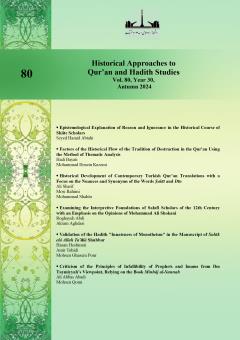Examining the Interpretive Foundations of Salafi Scholars of the 12th Century with an Emphasis on the Opinions of Mohammad Ali Shokani
Subject Areas : -Roghayeh Abdi 1 * , Akram Aghdasi 2
1 - Young Researchers Club, Islamic AzaAssistant Professor, Department of Islamic Studies, Science and Research Branch, Islamic Azad University, Tehran, Iran (corresponding author).d University, Tehran, Iran
2 - Assistant Professor, Department of Islamic Studies, Malard Branch, Islamic Azad University, Iran.
Keywords: Wahhabism, Salafism, Fatḥ al-Qadīr, Shokani, Esoteric Interpretation, Externalism. ,
Abstract :
In the 12th century, with the emergence of some individuals, we witness the revival of the ideas of ibn Taymiyyah and the movement of extreme Salafism. Denial of what is permissible in the Qur’an, extreme externalism use of hadiths, and turning away from applying rational and philosophical rules in the Qur’an are among the characteristics of the Salafi-Takfiri interpretative methodology. A study of the thoughts of the prominent Yemeni Zaydi scholar Shokani, while confirming Salafi tendencies and his commitment to the appearances of narrational evidence, shows his desire to explain religious rationality according to principles that do not contradict tradition. In other words, it expresses his anti-takfiri and unificationist approach despite his influence on the thoughts of the founder of modern Salafism - ibn Taymiyyah. The results of the analysis of Shokani's thoughts in the field of interpretive principles, which was conducted in a descriptive-analytical manner and in response to the question of comparing his views with the ideas of Takfiri Salafism, indicate his turning away from extreme externalism and accepting reasonable esoteric interpretation, thus distancing himself from the ideas of ibn Taymiyyah and extreme Salafism.

